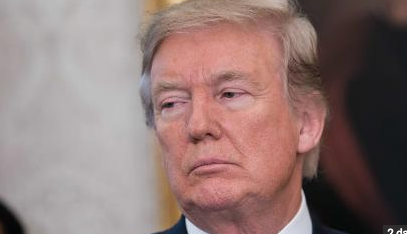A congressional fight over sex reassignment surgery threatened funding for his border wall.
House Republicans were planning to pass a spending bill stacked with his campaign promises, including money to build his border wall with Mexico.
But an internal House Republican fight over transgender troops was threatening to blow up the bill. And House GOP insiders feared they might not have the votes to pass the legislation because defense hawks wanted a ban on Pentagon-funded sex reassignment operations — something GOP leaders wouldn’t give them.
They turned to Trump, who didn’t hesitate. In the flash of a tweet, he announced that transgender troops would be banned altogether.
Trump’s sudden decision was, in part, a last-ditch attempt to save a House proposal full of his campaign promises that was on the verge of defeat, numerous congressional and White House sources said.
The president had always planned to scale back President Barack Obama-era policies welcoming such individuals in combat and greenlighting the military to pay for their medical treatment plans. But a behind-the-scenes GOP brawl threatening to tank a Pentagon funding increase and wall construction hastened Trump’s decision.
Numerous House conservatives and defense hawks this week had threatened to derail their own legislation if it did not include a prohibition on Pentagon funding for gender reassignment surgeries, which they deem a waste of taxpayer money. But GOP leaders were caught in a pinch between those demands and moderate Republicans who felt the proposal was blatantly discriminatory.
“There are several members of the conference who feel this really needs to be addressed,” said senior House Appropriations Committee member Robert Aderholt (R-Ala.) on Tuesday. “This isn’t about the transgender issue; it’s about the taxpayer dollars going to pay for the surgery out of the defense budget.”
That’s why House lawmakers took the matter to the Trump administration. And when Defense Secretary James Mattis refused to immediately upend the policy, they went straight to the White House. Trump — never one for political correctness — was all too happy to oblige.
“[P]lease be advised that the United States Government will not accept or allow Transgender individuals to serve in any capacity in the U.S. Military,” Trump tweeted Wednesday morning. “Our military must be focused on decisive and overwhelming victory and cannot be burdened with the tremendous medical costs and disruption that transgender in the military would entail.”
The president’s directive, of course, took the House issue a step beyond paying for gender reassignment surgery and other medical treatment. House Republicans were never debating expelling all transgender troops from the military.
“This is like someone told the White House to light a candle on the table and the WH set the whole table on fire,” said one senior House Republican aide. The source said that while GOP leaders asked the White House for help, they weren’t expecting — and got no heads up on — Trump’s far-reaching directive.
While Democrats and centrist Republicans are already blasting the move, one White House official said the decision would be “seen as common-sense” by millions — though likely vociferously protested by others.
“It’s not the worst thing in the world to have this fight,” the administration official said.
The announcement, multiple sources said, did not sit well with Mattis, who appeared to be trying to avoid the matter in recent weeks. Congressional sources say Rep. Vicky Hartzler (R-Mo.), the original author of the House’s transgender proposal, tried numerous times to phone Mattis to discuss the transgender issue.
It is unclear what Mattis told Hartzler at that time. But insiders say he felt there was no need to rush upending the policy, arguing the Pentagon needed time to study the issue. Their decision would affect at least 2,450 transgender active-military personnel, according to a Rand report — though military LGBT activist groups as many as as 15,000 soldiers fall into that category.
After lawmakers went around Mattis to engage the White House, Mattis was consulted before the announcement and knew the ban was being considered, according to several White House officials. But the decision ultimately came down from Trump and was “White House-driven,” Trump aides said.
The president was also annoyed by the Pentagon delay, one person said. A different official said the White House had gotten positive reaction from conservatives, an important factor amid their displeasure with Trump’s recent bashing of Jeff Sessions.
The transgender fight first surfaced in the House a few weeks ago. With the backing of almost the entire GOP conference, Hartzler offered an amendment to a defense authorization bill that would ban funding for gender reassignment surgeries and treatments for transgender active-duty personnel.
Republican supporters were shocked when a group of 24 mostly moderate Republicans teamed up with 190 Democrats to kill the effort in a 209-214 vote.
Republicans spent much of a closed-door GOP conference meeting the next morning steaming about what happened.
“It’s not so much the transgender surgery issue as much as we continue to let the defense bill be the mule for all of these social experiments that the left wants to try to hoist on government,” Rep. Trent Franks (R-Ariz.), a conservative supporter of the Hartzler proposal, said last week.
He added: “It seems to me, and all due respect to everyone, that if someone wants to come to the military, potentially risk their life to save the country, that they should probably decide whether they’re a man or woman before they do that.”
Supporters of Hartzler’s proposal were determined to try again. Last week, they began pushing GOP leadership to use a procedural trick to automatically include the controversial proposal in a Pentagon spending package set for a floor vote this week. The idea was to tuck the provision into a rules package governing the legislation, sidestepping a second potentially unsuccessful amendment vote and adding it to the bill without a floor fight.
Under intense pressure from moderates in the Tuesday Group to reject the idea, Speaker Paul Ryan (R-Wis.) and his team shied away from the strategy, worried that it would make them look hypocritical for circumventing regular order.
“Leadership should respect the will of the House — and that’s already been expressed,” said Rep. Carlos Curbelo (R-Fla.), a centrist who opposed the amendment. “These transgender service-people are serving our country and have signed up and agreed to risk their lives for this country, so we want to honor that commitment as well.”
That’s when lawmakers turned to the White House for help. They figured the administration could speed up a decision and settle the dispute once and for all.
“Conservatives were telling [the] White House they didn’t want money in a spending bill to go to transgender health services,” said one senior administration official, noting that it accelerated Trump’s decision.
Their argument fell on sympathetic ears, White House sources said. Chief strategist Steve Bannon encouraged Trump to deal with the matter now.
Hartzler and her supporters were elated.
“I’m glad the president will be changing this costly and damaging policy,” Hartzler said after the Trump’s announcement. “Military service is a privilege, not a right. We must ensure all our precious defense dollars are used to strengthen our national defense.”












































